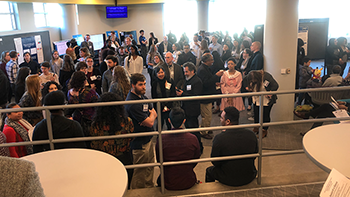Improving Surgical Safety Through Education
Description/Abstract/Artist Statement
Introduction and Background: Operation Smile is a nonprofit organization dedicated to providing cleft lip and cleft palate surgeries around the world. Surgical safety is the goal for every patient on every Operation Smile program (Operation Smile, 2019). Globally, unsafe surgical care procedures cause complications in up to 25% of patients. Almost 7 million suffer significant surgical complications annually, 1 million postoperative deaths (WHO, 2019). Surgical complications and death are two to three times higher in low- and middle-income countries than in high-income countries (WHO, 2019).
Aggregate: Medical professionals from Northern and sub-Saharan Africa.
- OR Operating Staff in Lilongwe, Malawi.
- OR and PACU staff in Agadir, Morocco.
- Trained and credentialed 3 OR nurses and 6 scrub nurses.
Objectives: Education--increase the capacity of local nursing workforce of highly skilled scrub nurses at the local mission level to ensure competent, safe, and high-quality practice in the Operating Rooms according to Operation Smile Global Standards. Identify the local nursing leadership to enhance future training. MH boxes--over 50% of Morocco team members who interact with the MH box will report increased knowledge confidence in responding to an MH crisis--over 75% of Morocco team members who interact with the MH box will agree it helps to ensure a quick response to a MH crisis.
Conclusions and Implications: The curriculum is equally accepted by both the OR and scrub nursing participants.100% of participants stated that they “gained more knowledge in their area experience, importance of safety and high quality of patient care, sterility and aseptic technique, learned how to handle both instruments and assessing the surgeon during procedure”. 100% indicated that they would recommend the MH box for future missions. Operation Smile Programs adhere with current MHAUS standards, which recommend an MH box in any areas that triggering agents will be administered to ensure quick access to treatment (MHAUS, n.d.).
Faculty Advisor/Mentor
Beth Tremblay
Presentation Type
Poster
Disciplines
Public Health and Community Nursing
Session Title
Poster Session
Location
Learning Commons, Atrium
Start Date
2-8-2020 8:00 AM
End Date
2-8-2020 12:30 PM
Improving Surgical Safety Through Education
Learning Commons, Atrium
Introduction and Background: Operation Smile is a nonprofit organization dedicated to providing cleft lip and cleft palate surgeries around the world. Surgical safety is the goal for every patient on every Operation Smile program (Operation Smile, 2019). Globally, unsafe surgical care procedures cause complications in up to 25% of patients. Almost 7 million suffer significant surgical complications annually, 1 million postoperative deaths (WHO, 2019). Surgical complications and death are two to three times higher in low- and middle-income countries than in high-income countries (WHO, 2019).
Aggregate: Medical professionals from Northern and sub-Saharan Africa.
- OR Operating Staff in Lilongwe, Malawi.
- OR and PACU staff in Agadir, Morocco.
- Trained and credentialed 3 OR nurses and 6 scrub nurses.
Objectives: Education--increase the capacity of local nursing workforce of highly skilled scrub nurses at the local mission level to ensure competent, safe, and high-quality practice in the Operating Rooms according to Operation Smile Global Standards. Identify the local nursing leadership to enhance future training. MH boxes--over 50% of Morocco team members who interact with the MH box will report increased knowledge confidence in responding to an MH crisis--over 75% of Morocco team members who interact with the MH box will agree it helps to ensure a quick response to a MH crisis.
Conclusions and Implications: The curriculum is equally accepted by both the OR and scrub nursing participants.100% of participants stated that they “gained more knowledge in their area experience, importance of safety and high quality of patient care, sterility and aseptic technique, learned how to handle both instruments and assessing the surgeon during procedure”. 100% indicated that they would recommend the MH box for future missions. Operation Smile Programs adhere with current MHAUS standards, which recommend an MH box in any areas that triggering agents will be administered to ensure quick access to treatment (MHAUS, n.d.).


